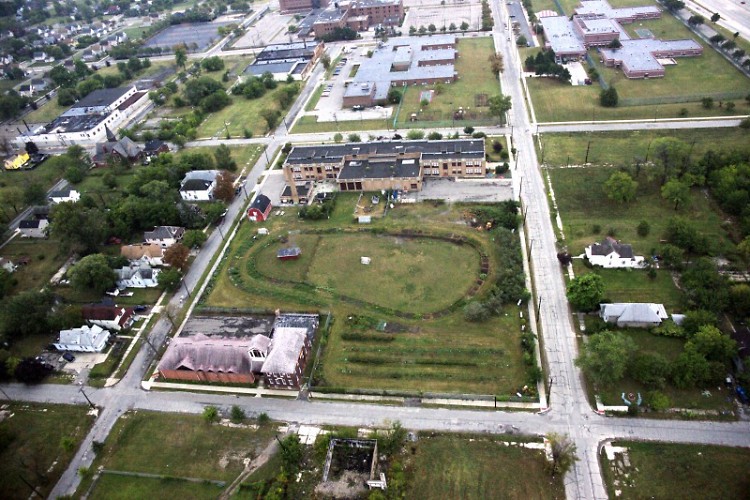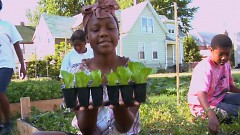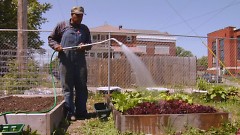In February, the WMEAC Film Series presented "Urban Roots," a documentary on the urban farming phenomenon in Detroit. The film covers the plight of post-industrial Detroit, specifically a decreasing population and scarcity of fresh food markets, and highlights the grassroots cooperation that is moving the city away from its status as a "food desert" - an area with limited access to fresh, affordable food.
While the West Michigan area is far from a food desert, with well-stocked supermarkets scattered throughout the city, Grand Rapids can relate to the increase in urban farming. The city has a newly-renovated farmers market, one on the way, and and a number of community gardens that have sprung up across the city.
A panel discussion following the film addressed what’s going on here in West Michigan. The three panelists included Lisa Oliver-King of Our Kitchen Table, Darryl Ross of LINC, and Jay Niewiek of The Spoke Folks, a nonprofit community bike shop co-op.
One of the first questions asked how people can get involved in community gardening. Some links to community gardens in the Grand Rapids area are listed in the sidebar.
With the increase in urban gardening, like in the film, there are also plenty of obstacles.
“There is a community support and relational piece," said Ross. "There is not a lot of community support around gardening or the sustainability of projects. For this to occur we must be building awareness.”
Unlike the movement in Detroit, Grand Rapids lacks the momentum created by the dire need for fresh, affordable food, such as that in Detroit. Zoning laws are also playing a factor, inhibiting community support. According to Oliver-King, zoning should be based on the community it will be affecting, versus enacting ordinances that affect multiple different communities.
The next group of questions focused on the role social media is playing in our gardening movement. Niewiek pointed out that social media has not been a major factor in Grand Rapids, but that it has had a larger effect on the movement as a whole across the nation.
“Using social media can exclude some who don’t use it. It should be one out of many tools in your knapsack,” said Niewiek.
The gardening jargon and even language used in spreading awareness should also be geared towards specific communities. With some communities having a 30 percent Hispanic population, materials should also be printed in Spanish, so we don’t inadvertedly gentrify our communities, said Niewiek.
A point brought up in Urban Roots was finding a clean area of soil for gardening. If you want to test your soil, Oliver-King recommends getting it tested at an accredited lab or by through the Michigan State University Extension. Self-mailing test kits may be purchased at extension offices or at the MSU Extension Bookstore for $25.
“Gardening can impact, but it’s not a fix-all,” said Ross.
The process can be complicated and messy, and Niewiek recommended looking at it in this context. In the final comments left by the panel, they reiterated how important communication is in the community gardening effort. The most important thing, according to Oliver-King, in starting a successful garden, is having conversations with your neighbors, sharing produce and working together. There’s no use in everyone growing the same crops, but rather creating a diverse harvest, she said. Forging these relationships ensures successful community involvement.
“It’s not just about what’s on my plate, but the quality of life,” said Oliver-King.
More information on future films presented by the WMEAC Film Series can be found at https://wmeac.org/filmseries/.
The Rapidian, a program of the 501(c)3 nonprofit Community Media Center, relies on the community’s support to help cover the cost of training reporters and publishing content.
We need your help.
If each of our readers and content creators who values this community platform help support its creation and maintenance, The Rapidian can continue to educate and facilitate a conversation around issues for years to come.
Please support The Rapidian and make a contribution today.



